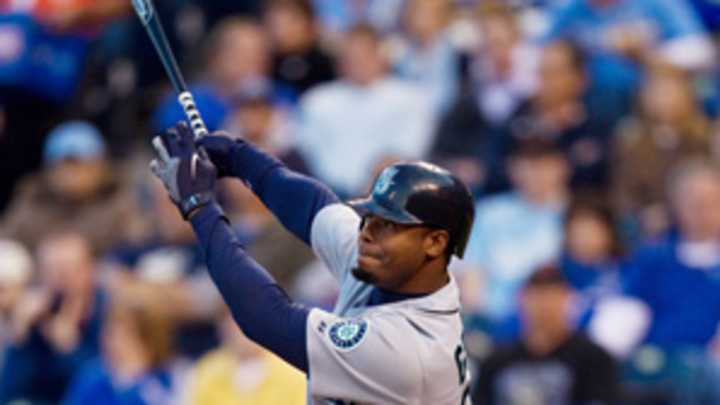Griffey should've retired last year, but '10 flameout won't taint legacy


"It is a melancholy thing, geriatrics for a 40-year-old.''-- Roger Kahn, writing about Stan Musial
Maybe 40-year-old Ken Griffey Jr. was sleeping in the clubhouse during a game last week and maybe he wasn't. Griffey was vague in his denial. It doesn't matter. Metaphorically, he's been sleeping all spring: 80 at-bats as a DH, no homers, a .225 slugging percentage.
It's different to be 40 and washed up. For the rest of us, 40 is a launching pad, 10 toes on the edge of the surfboard. We've only just begun. For an athlete, it's a daily reminder of who he used to be. At age 42 in 1963, Musial hit a tortured .255, with 12 home runs in 379 at-bats. Then he quit.
After the last game of the '09 season, Griffey's Seattle teammates hoisted him atop their shoulders and carried him around Safeco Field. A surprisingly good, 85-win season had been sweetened with the return of Griffey's laughing clubhouse presence. It was a six-month going-away party, and it ended fittingly. Turn up the house lights. Thanks for coming.
Athletes aren't good at encores, though. Great athletes are especially lousy at it. It's pride and ego and real-world doubt. It's the notion that life will never be as good. Athletes don't do mirror-gazing well.
Indications are that Griffey could call it quits in the next several days. When he decided to return to the Mariners before the '09 season, he told Seattle president Chuck Armstrong he didn't want to become a sideshow. He was a ballplayer, not living history or a vehicle for selling commemoratives.
Now that Griffey has become what he dreaded, he's ready to say goodbye.
The image of Uncle Junior catnapping is not flattering, but in the big, 22-year career picture, it's dust on the lens. Griffey was the best player of the Steroid Era. He escaped the taint of pharmaceuticals. Even as injuries tore apart his eight-plus seasons in Cincinnati, Griffey resisted the heal-faster, workout-harder magic that PEDs supposedly provide.
I asked him once why he never kept up with the Bondses.
"I want to be able to look my kids in the eye,'' Griffey said.
I covered Griffey's years in Cincinnati. They amounted to an unopened package. The Griffey Era in Cincinnati was defined by injury and resentment, and far more melodrama than the real kind. The Kid of Seattle was not the same when he returned to his hometown.
"They want me to fail,'' he said to me, three years into his stay in Cincinnati. Griffey meant the fans, who he believed neither appreciated nor understood the countless hours he spent rehabbing his body after every injury. I was stunned that a player could misread so totally the passion of his hometown supporters. But that was Griffey in Cincinnati.
The hat-backward days of his youth succumbed to the cynical reality of adulthood. Griffey never felt loved in Cincinnati. There was a fundamental mistrust between player and fan, between player and hometown. Fans in Cincinnati like their sports heroes to be approachable, not regal. Griffey didn't save baseball in Cincy, the way he had in Seattle. Fair or not, he became the symbol for the Reds' organizational floundering.
"They don't want you to fail,'' I said finally. "They want you to hit 40 home runs.''
The list of Griffey's injuries while he played for the Reds is enough to make a surgeon wince: Torn left hamstring, torn right hamstring, ankle surgery, torn knee tendon, dislocated shoulder, arthroscopic knee surgery, pleurisy, sprained foot, dislocated toe. All in what should have been his prime.
Griffey averaged 109 games a year for the Reds. For three consecutive years, 2002-04, he played fewer than 100 games. Griffey was just 32, 33 and 34 years old then. The team was bad, the fans needed a scapegoat. Griffey was available.
Fans expected the outwardly joyous player who made the clubhouse a carnival of good-natured insults and jock humor. I wanted to know that guy. I never did. Wounded by slights real and imagined, The Kid retreated. He never got the homecoming he envisioned. That wouldn't come until last year, when he returned to Seattle.
"Great expectations, but disappointment over the injuries'' was how Griffey's longtime agent, Brian Goldberg, described his client's time in Cincinnati. "The rest of the team underachieved. That got lost in the shuffle. If Junior had never gotten hurt and averaged 45 homers and 125 RBIs, the Reds still would never have sniffed better than second place.''
Maybe. But at that pace Griffey would be the best home run hitter who ever lived and the world would be marveling that he did it the right way. This 2010 swan song might be a little less grim. Regardless, whether Griffey retires this week or later this season, he'll do so knowing he honored the game and those who played it. For 22 years, he has been a good player, teammate, husband, father and friend.
We grieve a little for the great ones who don't go out gracefully, but no more than we grieve for ourselves. Their mortality reminds us of our own. It is a melancholy thing, being 40 and a professional athlete. But it won't last, the way the records and the memories will. It won't define him.
